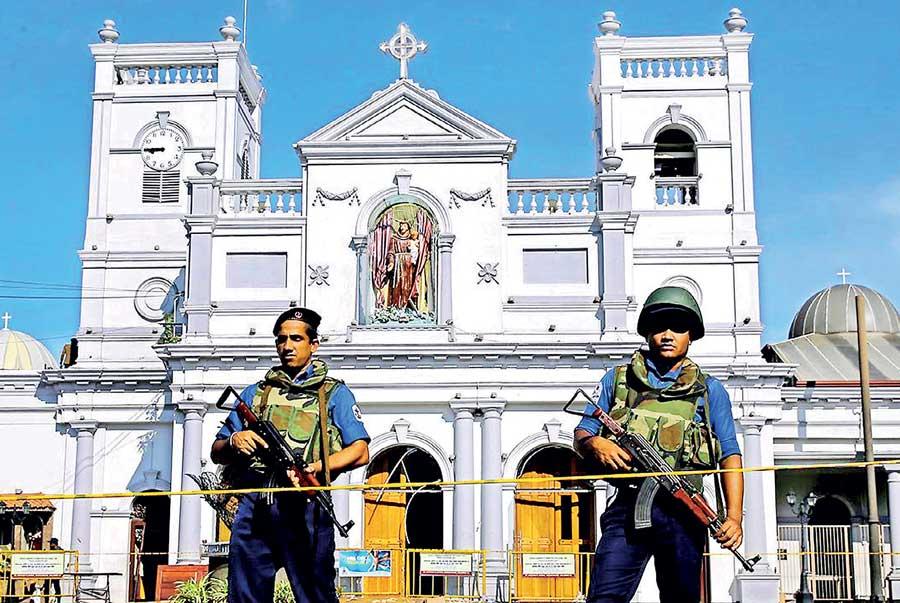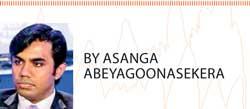04 Jul 2019 - {{hitsCtrl.values.hits}}

 Life is nasty, brutish and short. The horror of the Easter Sunday attack in Sri Lanka will prove Thomas Hobbes was correct. The child that lost her parents or the parent that lost their child unaware why this disgraceful act of brutality came to their lives.
Life is nasty, brutish and short. The horror of the Easter Sunday attack in Sri Lanka will prove Thomas Hobbes was correct. The child that lost her parents or the parent that lost their child unaware why this disgraceful act of brutality came to their lives.
During a visit to Berlin an expert who has studied ISIS rightly said to me, “your country was staged”. It was not an ISIS directed attack but an influenced attack. If it was staged, who was behind in staging this terror? Willingly or unwillingly, you would have to draw on geopolitics to answer the underlying question.
Western hemisphere is ours
Four days before the Easter Sunday bombing in Sri Lanka, John Bolton, the National Security Advisor a living example of liberal hegemony, ardent supporter of regime change according to many western scholars, says “Today, we proudly proclaim for all to hear: the Monroe Doctrine is alive and well,…the twilight of socialism has arrived in our hemisphere….We will need your help in the days ahead.
We must all reject the forces of communism and socialism in this hemisphere—and in this country”. He re-affirmed that the western hemisphere belongs to United States. An evil troika is in the making in the backdrop of US geography, according to Bolton. This, he describes, is Venezuela, Nicaragua and Cuba. It seems, Fukuyama got it wrong in his 1992 “The End of History and the Last Man”.
Over a visit to Sri Lanka a few months ago, Samantha Powers referred to Fukuyama’s work as a book about the global triumph of liberalism ‘that there is a common evolutionary pattern for all human societies…in the direction
of liberal democracy.’
Where Bolton and Powers got it wrong was that they believed in a single theory of Fukuyama. He explains in his book there will be ‘no struggle or conflict over ‘large’ issues consequently no need for generals or statesmen; what remains is economic activity’ for the US. John Muller, Stanley Hoffman and Friedman all followed this “Golden Straitjacket” that suppressed the geopolitical theories of great power politics, pushing forward a liberal order, reinforcing the sense of optimism about democracy and human rights was the belief the economic globalization was opening the door to a new era of peace and prosperity, followed by Clinton,Bush,Obama and Trump.
Steven Walt explains although subsequent US administrations in post cold war differ in their diplomatic styles and policies, “liberal hegemony remained the default strategy all of them assumed US leadership was essential to global progress and each administration sought to use American power to spread democracy expand US influence and security commitment and reinforce a rules based liberal world order” . Efforts to bring these values in the Middle East military expeditions proved the theory itself doesn’t support the outcomes.
It was Osama Bin Laden in the 80s that kept the Soviets out of the Indian Ocean, by taking the side of the US defeating the Communist Soviet Union. If this did not take place Fukuyama would not have written his masterpiece. Looking at the US liberal hegemonic foreign policy adopted from the time of the fall of the Berlin Wall in 1989, Soviet Russia was clearly the reason why many nations did not embrace liberal values which USA tried in its crusading expedition. When Russia fell, USA was the single power holding the balance of the global system. The holder of the balance threw its weight at the scale to promote liberal hegemony.
Unsinkable aircraft carrier
Taking the liberal hegemonic theory to the distant oceans in the Eastern Hemisphere, the Indian Ocean a vital highway of the global energy market. There is only one unsinkable aircraft carrier that the US military own in the Indian Ocean, which is in Diego Garcia. The Portuguese explorer Pedro Mascaren has discovered the island in 1512. It is located equidistant from all points of the Indian Ocean and also called the “Malta of the Indian Ocean”.
This island was a blessing to move forward the US liberal hegemonic foreign policy. In Spanish Deo Gratias means ‘Thank [be] to God’, and this really applies geopolitically when looking out the missions carried out during the last few decades. From the Iranian revolution, the Iraqi invasion of Kuwait, Operation Desert Fox, Operation Enduring Freedom, Operation Iraqi Freedom and many more future military expeditions will be carried out from this forward flexible strategic hub, echoing the US foreign policy towards the entire Indian
Ocean. In February 2019, a ruling of the International Court of Justice was made to transfer the islands to Mauritius, a definite signal perhaps to explore for an alternative location in the Indian Ocean.
In the same manner discovered by the Portuguese seven years before was the Island Sri Lanka, siting less than 2000km away from Diego Garcia. The teardrop shaped island at the center of Indian Ocean ‘Sea lines of Communications (SLOCs)’. During the Cold War, Sri Lanka took a nonaligned position in its foreign policy. Today a multi-aligned foreign policy is visible, struggling to calibrate internally, and strike a balance due to great power rivalries. Imagine a tightrope walker without the pole. The long pole which gave stability was taken away from Sri Lanka by the great power rivalry and
internal political disunity.
Small nations always owed their independence either to the balance of power or rejection of imperial aspirations. While US sees China as a National Security threat in its latest trade sanctions, Sri Lanka’s position in the global power balance between USA and a rising China is an important factor.
Former US Ambassador to Sri Lanka, Robert Blake highlights in his recent interview in Colombo, “First, my advice to America is that it should not ask the countries to choose between China and the U.S. They do not want to choose. They want to have good relations with the US, China,
India and others.”
This cannot be achieved with US liberal hegemonic aspirations in the Indian Ocean. Any foreign security agreement from global powers should be vetted from the Parliamentary body with inputs from National Security Researchers. Else, it may trigger serious national security implications in the future.
A process needs to be in place. Instead of baseless allegations, careful observations and research inputs has to be fed in to the security establishment. The independence of Sri Lanka will be in jeopardy if the US or China takes a decisive turn in favor to pull Sri Lanka towards it’s respective orbit. Sri Lanka in the past has been pulled towards China to gain a decisive and permanent advantage. The recalibration towards achieving a balance by Prime Minister Wickramasinghe was seen as a threat by China, as certain policies made the Island nation vulnerable for liberal hegemony to grow. It is essential to find the lost stabilizer to balance to reach the end on the tight rope.
Need of the hour to uplifting national morale
National morale is the degree of determination with which a nation supports the foreign policies of its government in peace or war. According to Hans Morganthaue, it permeates all activities of a nation including its military establishment and diplomatic service.
In 2015, the unitary government divided its portfolios leaving the President with national security and foreign in the other political party. After the 30/1 UNHRC resolution and subsequent actions there was a deep polarization between the two that triggered a national security threat perhaps unnoticed for some time but instability was felt by the entire nation
time to time.
Some days ago, after the Easter attack, the President took a flight to China to meet President Xi while his Foreign Minister took a flight to US to meet Mike Pompeo. Both left perhaps to bring in assistance from the two polarized camps. The US has explained in their National Security Strategy that their number one threat is China and Russia, and number two is ISIS.
This deep polarization between the establishments breaks the morale of our nation. It threatens and limits the nation’s power to carry out its agenda forward or stabilize internal politics. In this vulnerable environment, external threats will creep in to take advantage of the State actors working in silos within the establishment.
(Asanga Abeyagoonasekera is the author of ‘Sri Lanka at Crossroads’(2019), Director General of the National Security Think Tank of Sri Lanka (INSSSL) under the Sri Lanka Defence Ministry, views expressed are authors own, the article was initially published by Hudson Institute Washington DC)
15 Nov 2024 11 minute ago
15 Nov 2024 1 hours ago
15 Nov 2024 1 hours ago
15 Nov 2024 1 hours ago
15 Nov 2024 2 hours ago